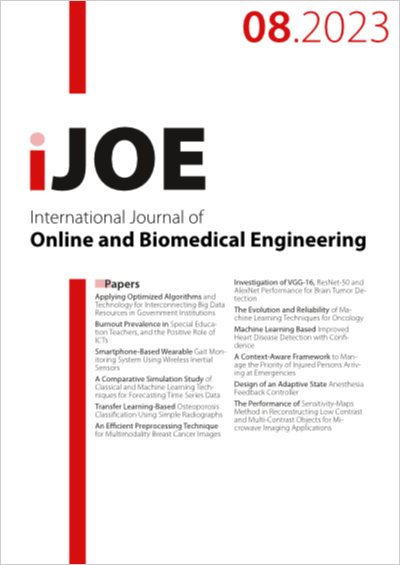The Performance of Sensitivity-Maps Method in Reconstructing Low Contrast and Multi-Contrast Objects for Microwave Imaging Applications
DOI:
https://doi.org/10.3991/ijoe.v19i08.38665Keywords:
image reconstruction, inverse scattering, microwave imaging, multifrequency imaging, sensitivity-mapsAbstract
The microwave imaging system for breast tumor/cancer detection requires high sensitivity to detect abnormal tissue that has little contrast in high-density breasts. This paper proposes a qualitative microwave imaging system simulation based on inverse scattering using the sensitivity-maps method. This method utilizes two measurement types for system calibration: a reference object as a scatterer-free background and a calibration object to obtain the system's impulse response. The object under test (OUT) consists of an object with low dielectric contrast and a phantom with multiple low dielectric contrasts (multi-contrast). Reconstruction is carried out on three types of S-parameter measurement data, namely S_11,〖 S〗_21, and a combination of both. S-parameters are measured at several frequencies, which are 3, 10, 14, 15, 16, 20 GHz, and the combination of all those frequencies (multifrequency). Reconstructed images show that the system is capable of reconstructing dielectric objects accurately. Quantitatively, the results show that the multifrequency S_21 measurement yields the best image quality with relative root mean squared error (RRMSE) values of 0.1272 and structural similarity index (SSIM) of 0.9076. The designed imaging system also successfully reconstructs multi-contrast phantom accurately with RRMSE of 0.1434 and SSIM of 0.4609.
Downloads
Published
How to Cite
Issue
Section
License
Copyright (c) 2023 Dr. Basari, Syahrul Ramdani

This work is licensed under a Creative Commons Attribution 4.0 International License.



